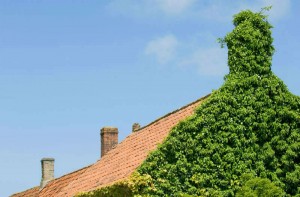Although the look of ivy climbing up your masonry chimney can be a beautiful sight, this climbing vine can actually damage its structure. Especially if your home was built before 1930, ivy may cause deterioration of the bricks and mortar of your chimney. Masons did not use mortar mixed with Portland cement to construct homes until after 1930, and the earlier mortar mixes are not nearly as strong and durable, according to Today’s Homeowner. Climbing vines like ivy can easily grow into any existing cracks in the bricks and mortar, and this growth can quickly worsen that damage. Our staff at Hudson Chimney knows that many people love the appearance of climbing vines growing against their chimneys, but we would like to tell you more about why ivy and other similar plants can damage your chimney.
What kind of damage can ivy and other climbing vines do to my chimney?
Certain types of ivy such as English ivy grow very aggressively and will attach themselves into cracks and other eroded areas in the masonry materials of your chimney. Additionally, it can be challenging to even see spalling and erosion damage of the bricks and mortar when your chimney is covered by ivy. One of the biggest problems with ivy growing into your masonry chimney is that if you attempt to pull away any ivy growth to check for cracked or missing bricks, you risk the possibility of pulling down your entire chimney structure.
What can I do if I want to keep the ivy growing on my chimney?
Hudson Chimney can professionally inspect the condition of the masonry materials of your chimney to see if it can support the growth of climbing vines without suffering from further damage. Well-built masonry chimneys typically do not have problems with damage from ivy and other climbing vines. Our expert chimney technicians will know if your chimney was built with mortar containing Portland cement, and we will make any necessary repair recommendations that should be done that will allow you to keep your ivy growing against your chimney.
Does Hudson Chimney have any recommendations of better climbing vines to plant?
We do suggest that you avoid any aggressive vines such as English ivy. Virginia creeper and Boston ivy are great alternatives to consider planting. You can also keep these vines from growing directly against the chimney by installing a support made of wire, lattice, or trellis around your chimney. Non-attaching climbing vines such as roses, wisteria, clematis, and jasmine can easily grow along this type of support without any possible damage done to your chimney. Even better, you can move the support to make chimney inspections and repairs easier.
If your older chimney is covered with ivy, contact us at Hudson Chimney. We can inspect the condition of your chimney to be sure no damage has been done.
